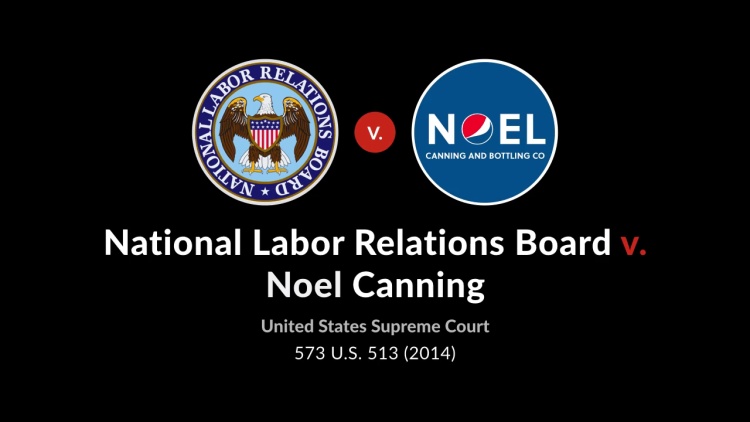National Labor Relations Board v. Noel Canning
United States Supreme Court
573 U.S. 513, 134 S. Ct. 2550 (2014)
- Written by Angela Patrick, JD
Facts
The president of the United States nominated three individuals to positions on the National Labor Relations Board (NLRB) (defendant). The Senate did not confirm these positions before taking a break that ran from December 17 to January 20. The Senate’s break was technically multiple three-day intra-session recesses in between four-day pro forma sessions. During the pro forma sessions, the Senate retained the power to conduct business but resolved not to conduct business. During one three-day intra-session recess, the president used the Recess Appointments Clause (Recess Clause) in Article II of the Unted States Constitution to appoint all three individuals to the NLRB without the advice and consent of the Senate. Subsequently, the NLRB ordered a Pepsi-Cola distribution company, Noel Canning (Canning) (plaintiff), to enter into a collective-bargaining agreement. Canning sought to have the NLRB’s order set aside by the federal court of appeals. Canning challenged the NLRB’s authority to issue the order, arguing that the three new NLRB members had not been validly appointed because the Recess Clause did not apply to a three-day recess between pro forma sessions of the Senate. The court of appeals held that the NLRB’s order was invalid. The United States Supreme Court granted certiorari.
Rule of Law
Issue
Holding and Reasoning (Breyer, J.)
Concurrence (Scalia, J.)
What to do next…
Here's why 905,000 law students have relied on our case briefs:
- Written by law professors and practitioners, not other law students. 47,100 briefs, keyed to 995 casebooks. Top-notch customer support.
- The right amount of information, includes the facts, issues, rule of law, holding and reasoning, and any concurrences and dissents.
- Access in your classes, works on your mobile and tablet. Massive library of related video lessons and high quality multiple-choice questions.
- Easy to use, uniform format for every case brief. Written in plain English, not in legalese. Our briefs summarize and simplify; they don’t just repeat the court’s language.





